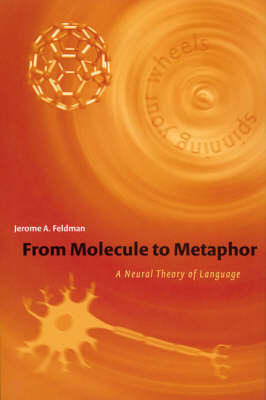
From Molecule to Metaphor
A Neural Theory of Language
Seiten
2006
Bradford Books (Verlag)
978-0-262-06253-4 (ISBN)
Bradford Books (Verlag)
978-0-262-06253-4 (ISBN)
- Titel ist leider vergriffen;
keine Neuauflage - Artikel merken
A theory that treats language not as an abstract symbol system but as a function of our brains and experience, integrating recent findings from biology, computer science, linguistics, and psychology, and demonstrated with computational models.
In From Molecule to Metaphor, Jerome Feldman proposes a theory of language and thought that treats language not as an abstract symbol system but as a human biological ability that can be studied as a function of the brain, as vision and motor control are studied. This theory, he writes, is a "bridging theory" that works from extensive knowledge at two ends of a causal chain to explicate the links between. Although the cognitive sciences are revealing much about how our brains produce language and thought, we do not yet know exactly how words are understood or have any methodology for finding out. Feldman develops his theory in computer simulations -- formal models that suggest ways that language and thought may be realized in the brain. Combining key findings and theories from biology, computer science, linguistics, and psychology, Feldman synthesizes a theory by exhibiting programs that demonstrate the required behavior while remaining consistent with the findings from all disciplines.
After presenting the essential results on language, learning, neural computation, the biology of neurons and neural circuits, and the mind/brain, Feldman introduces specific demonstrations and formal models of such topics as how children learn their first words, words for abstract and metaphorical concepts, understanding stories, and grammar (including "hot-button" issues surrounding the innateness of human grammar). With this accessible, comprehensive book Feldman offers readers who want to understand how our brains create thought and language a theory of language that is intuitively plausible and also consistent with existing scientific data at all levels.
In From Molecule to Metaphor, Jerome Feldman proposes a theory of language and thought that treats language not as an abstract symbol system but as a human biological ability that can be studied as a function of the brain, as vision and motor control are studied. This theory, he writes, is a "bridging theory" that works from extensive knowledge at two ends of a causal chain to explicate the links between. Although the cognitive sciences are revealing much about how our brains produce language and thought, we do not yet know exactly how words are understood or have any methodology for finding out. Feldman develops his theory in computer simulations -- formal models that suggest ways that language and thought may be realized in the brain. Combining key findings and theories from biology, computer science, linguistics, and psychology, Feldman synthesizes a theory by exhibiting programs that demonstrate the required behavior while remaining consistent with the findings from all disciplines.
After presenting the essential results on language, learning, neural computation, the biology of neurons and neural circuits, and the mind/brain, Feldman introduces specific demonstrations and formal models of such topics as how children learn their first words, words for abstract and metaphorical concepts, understanding stories, and grammar (including "hot-button" issues surrounding the innateness of human grammar). With this accessible, comprehensive book Feldman offers readers who want to understand how our brains create thought and language a theory of language that is intuitively plausible and also consistent with existing scientific data at all levels.
Jerome A. Feldman is Professor of Electrical Engineering and Computer Science and former Director of the Cognitive Science Program at the University of California, Berkeley, and a Research Scientist at the International Computer Science Institute.
| Reihe/Serie | From Molecule to Metaphor |
|---|---|
| Zusatzinfo | 37 illus. |
| Verlagsort | Massachusetts |
| Sprache | englisch |
| Maße | 152 x 229 mm |
| Gewicht | 658 g |
| Themenwelt | Geisteswissenschaften ► Psychologie ► Allgemeine Psychologie |
| Geisteswissenschaften ► Psychologie ► Verhaltenstherapie | |
| ISBN-10 | 0-262-06253-4 / 0262062534 |
| ISBN-13 | 978-0-262-06253-4 / 9780262062534 |
| Zustand | Neuware |
| Informationen gemäß Produktsicherheitsverordnung (GPSR) | |
| Haben Sie eine Frage zum Produkt? |
Mehr entdecken
aus dem Bereich
aus dem Bereich
Techniken der Verhaltenstherapie
Buch (2024)
Julius Beltz GmbH & Co. KG (Verlag)
CHF 48,95


